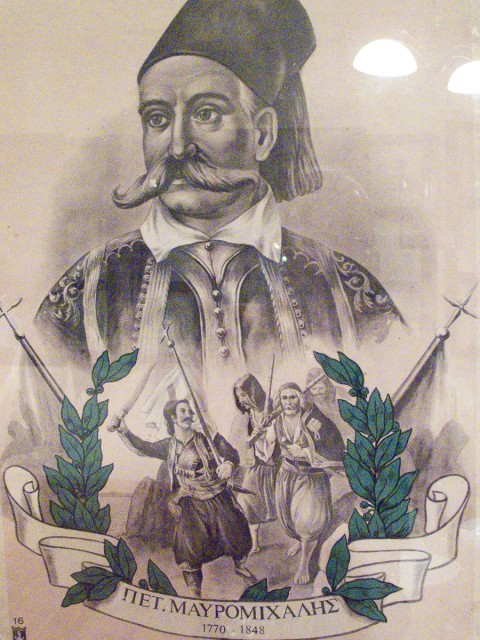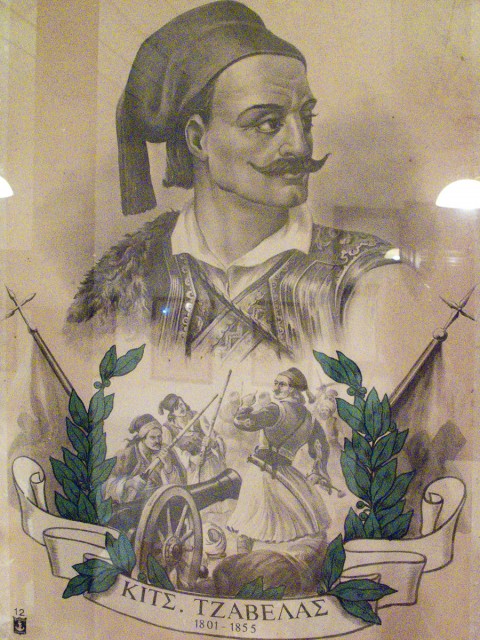These fantastic old posters are part of a series that adorn the walls in the old school building in Zizani.

On May 27, 1821, Dimitris Papanikolis sailed into the harbour of Eressos, Lesbos, and set fire to a Turkish war ship that was heading for Peloponnisos to help quell the Greek revolution.
Papanikolis also took part in several other acts of sabotage against the Ottoman fleet.

In May 1821, Omer Vryonis, the commander of the Ottoman army, advanced with 8,000 men, and after crushing the resistance of the Greeks at the river of Alamana, headed south into the Peloponnese to quell the Greek uprising.
Odysseas Androutsos with a band of 100 or so men took up a defensive position at an inn near Gravia. Vrionis attacked the inn but was repulsed with heavy casualties (over 400 dead). Finally, he was forced to ask for reinforcements and artillery but the Greeks managed to slip out before the reinforcements arrived. Androutsos lost two men in the battle and earned the title of Commander in Chief of the Greek forces in Roumeli.

Petros Mavromichalis (1765-1848), also known as Petrobey, was the leader of the Maniot people during the first half of the 19th century.
Mavromichalis’ family had a long history of revolts against the Ottoman Empire, which ruled most of what is now Greece. During a period of infighting between the leaders of Mani, young Petros gained a reputation for mediating the disputes and reuniting the warring families. After this he made an alliance with Napoleon Bonaparte, who was fighting in Egypt; Napoleon was to strike the Ottoman Empire in coordination with a Greek revolt. Napoleon’s failure in Egypt doomed that plan.
By 1814, the reorganized Maniots again became a threat to the Ottomans, and the sultan offered a number of concessions to Mavromichalis, including his being named Bey, or Chieftain, of Mani. Still, Petrobey continued to organize the Greek capetanei (commanders) of Morea for the revolution that was soon to come. On March 17, 1821, Petrobey raised his war flag in Areopolis, effectively signaling the start of the Greek War of Independence. His troops marched into Kalamata, and took the city on March 23.

Kitsos Tzavelas was born in Souli, Epirus in 1800, the son of Fotos Tzavelas and grandson of Lambros Tzavelas, both of whom were famous for their roles in the Souliot struggles against Ali Pasha, the Pasha of Yannina. He grew up in exile in Corfu. He played a leading role in the Greek War of Independence in 1821, alongside Georgios Karaiskakis, distinguishing himself especially during the siege of Messolonghi. After the arrival in Greece of Ioannis Kapodistrias, during the latter part of the war, Tzavelas was responsible for liberating a large part of Central Greece.


Comments are closed.